How To Fix A Noisy Washing Machine At Home?

Washing machines have evolved over the past few years, but like all electronic appliances, they are not immune to problems. One of the most common complaints from homeowners is about a noisy washing machine. From rumbling to scratching sounds, a noisy washer can quickly turn laundry day into a day of frustration. In this article, we will delve into the common culprits, possible solutions, and learn how to fix a noisy washing machine.
- Unbalanced Load - A Top Reason for a Noisy Washing Machine
- Loose Items Inside the Drum
- Worn Out or Broken Drum Bearings
- Blocked Lint Filter or Lint Trap
- Problems with the Drive Belt or Driver Belt
- Water Inlet Valve Issues
- Deteriorating Motor Brushes
- Preventive Measures for Less Noise
- Tips To Fix A Noisy Washing Machine
- Most Common Reasons For Noisy Washing Machine
- Wrapping Up
1 Unbalanced Load - A Top Reason for a Noisy Washing Machine
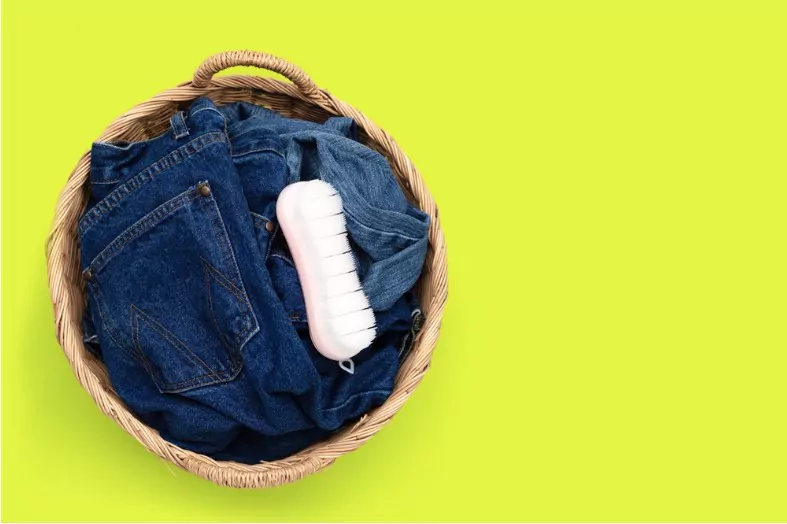
When your washing machine is making noise, especially during the spin cycle, an unbalanced load can often be the common cause. Heavy items, such as towels or jeans, can cause the drum to spin unevenly. This results in loud noise and can even cause the machine to vibrate excessively.
Solution: Redistribute your clothes in the drum. Avoid washing all heavy items in one go. Make sure to mix lighter items with heavier ones to balance the load. If the washer continues to spin unevenly, use a spirit level to ensure the machine is completely level and makes firm contact with the floor.
2 Loose Items Inside the Drum
Another common reason for a noisy washing machine is loose items like coins, bra wire, or other small objects getting stuck. These items can create a loud rumbling noise or scratching sounds.
Solution: Check pockets before washing and ensure no loose items remain inside the drum. If you hear strange sounds, it’s wise to pause the machine and inspect it. Also, routinely check the rubber seal around the door for any trapped items.
3 Worn Out or Broken Drum Bearings
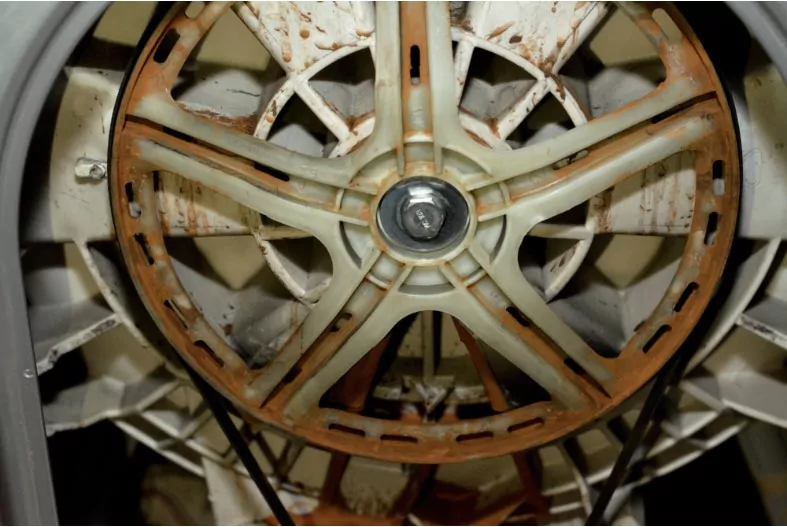
When your washing machine is making a loud noise, especially during the spin cycle, it could be due to worn or broken drum bearings. The bearings allow the drum to spin smoothly, but with time they can wear out, leading to a loud rumbling noise.
Solution: Replacing drum bearings is not a simple DIY task. It’s best to consult the instruction manual or get professional help. If bearings are the issue, you might need a complete replacement.
4 Blocked Lint Filter or Lint Trap
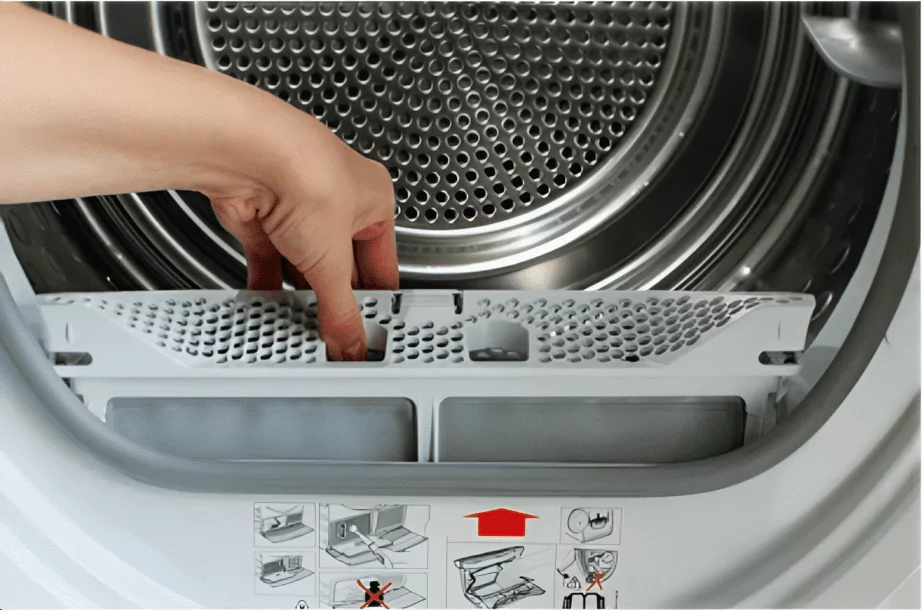
Lint filters or traps collect debris from clothes. Over time, a build-up can lead to the washing machine making loud noises.
Solution: Regularly clean the lint filter. If the filter is clogged, give it a good clean. Not only will this reduce the noise, but it’ll also ensure efficient washing.
5 Problems with the Drive Belt or Driver Belt
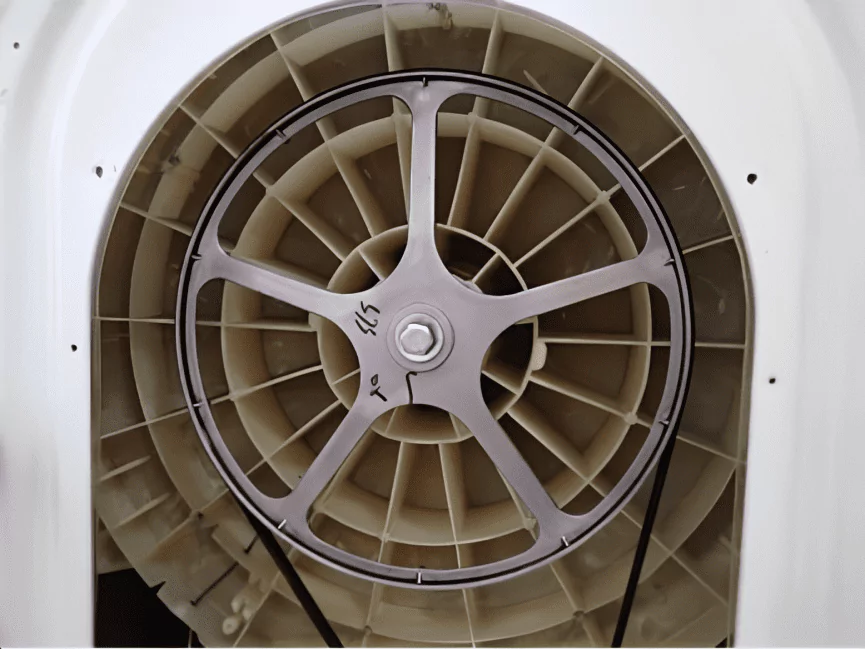
The drive belt connects the motor to the drum. If it’s worn out or has become loose, your washer might start making loud noises or might not spin at all.
Solution: Inspect the drive belt. If it’s showing signs of wear, replace it. If you’re unsure, refer to your instruction manual or call a professional. In some cases, a new belt might be needed.
6 Water Inlet Valve Issues
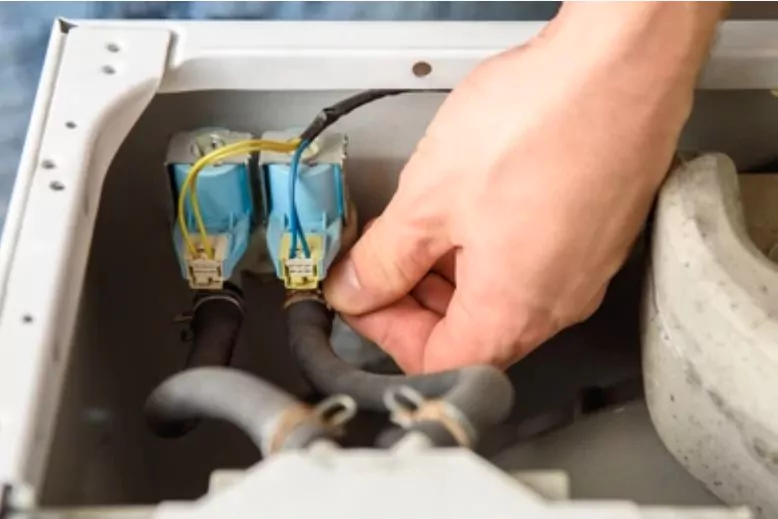
The water inlet valve controls the water flow into the machine. If it’s malfunctioning or broken, you’ll likely hear a noisy washing sound during the filling cycle.
Solution: Inspect the inlet valve. If there’s a build-up of mineral deposits or it’s damaged, it might need replacement.
7 Deteriorating Motor Brushes
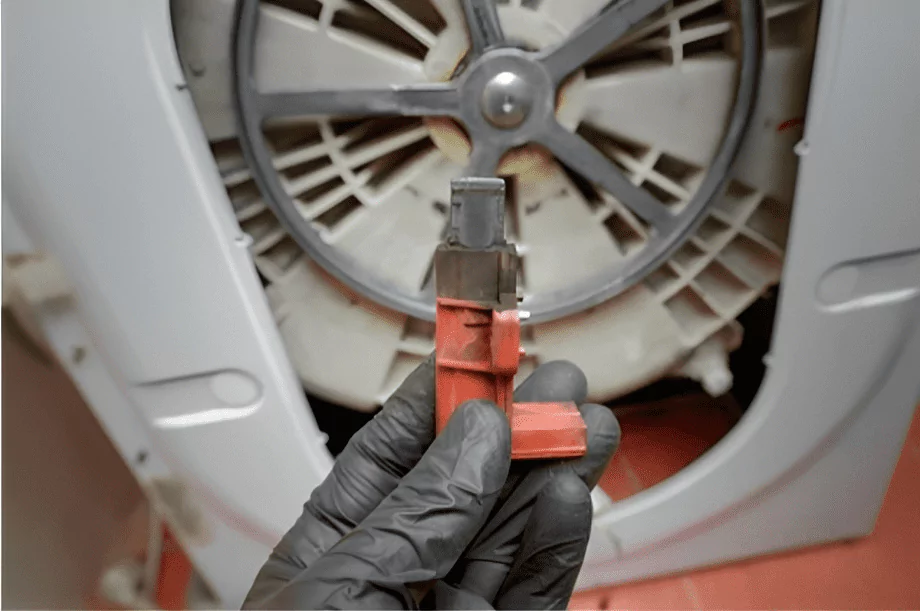
One of the most common reasons for a washing machine making noise is the motor brushes wearing out. They play a crucial role in motor functioning, but they wear out over time.
Solution: This is a technical fix. It’s best to consult the manual or hire an expert to replace worn motor brushes.
8 Preventive Measures for Less Noise
To avoid a noisy washing machine:
- Leveling the machine: Ensure your machine is completely level. Use a spirit level for accuracy.
- Check for loose items regularly: Coins, bra wires, and other small items are common culprits.
- Routine Maintenance: Regularly clean the lint filter, rubber seal, and other components.
- Avoid Overloading: This can lead to an unbalanced load and more noise.
- Regular Inspections: Keep an ear out for any strange sounds and inspect your washer at regular intervals.
9 Tips To Fix A Noisy Washing Machine
A noisy washing machine can be more than just a nuisance—it may indicate a budding mechanical issue. Before calling in a professional, try these straightforward tips to diagnose and potentially fix the source of the noise.
Check for Loose Items
- Empty all pockets before washing. Coins, keys, and small metal objects can fall out and create noise.
- After every wash, inspect the drum for left-behind items, especially things like bra wires or small toys, which can get trapped.
Inspect the Feet
- Ensure that all four feet of the washer are in firm contact with the ground.
- If your washing machine is vibrating excessively, adjust the feet to ensure it’s completely level. You can use a spirit level to help with this.
Examine the Drum
- Spin the drum manually. If you hear a rumbling noise, the drum bearings might be worn out. While you can access and check them, replacing them might be a job for professionals.
Clean the Machine
- Over time, dirt, soap, and minerals can build up, causing noise. Run an empty hot cycle with a washing machine cleaner or white vinegar to dissolve residues.
Examine External Pipes and Hoses
- Ensure that inlet and outlet hoses aren’t tangled or kinked. A hose that’s obstructed can lead to unusual sounds.
Look at the Motor's Carbon Brushes
- If they’re worn out, the motor may produce a sparking sound. Check and replace them if necessary. However, dealing with the motor might be better suited for professionals.
Dampening Straps
- If your washer has them, ensure that the dampening straps are intact. These are rubber attachments that help reduce vibration. If broken or worn out, they can cause noise.
Consult the Manual
Your washing machine’s instruction manual can offer solutions specific to your model. Familiarize yourself with it and use it as a troubleshooting guide.
10 Most Common Reasons For Noisy Washing Machine
A noisy washing machine can be unsettling, often causing worry about potential hefty repair costs or the hassle of replacement. The noise can range from humming, rattling, and banging to more distinct sounds like squealing or grinding. While several factors can cause a washing machine to be noisy, understanding the most common reasons can help in diagnosing and possibly fixing the problem.
Loose Items:
Small items such as coins, keys, bra wires, or even buttons can easily get trapped in the drum or between the drum and the outer tub. When the drum rotates, these items can produce a range of sounds – from tapping and rattling to more pronounced scratching sounds.
Damaged Drive Belt:
The drive belt connects the motor to the drum. A worn, loose, or damaged belt can slip or become misaligned, leading to a screeching or squealing noise.
Water Inlet Valve:
If you hear a buzzing or humming sound when the machine is filling with water, the water inlet valve might be the culprit. It may be functioning improperly or could be clogged.
Worn-out Motor Brushes:
The brushes in the motor can wear out over time. When they do, they might produce a sparking or crackling noise.
Blocked or Clogged Pump:
Objects or lint can occasionally block the pump. When this happens, you may hear a humming or grinding sound, especially when the machine is trying to drain the water.
Damaged Tub or Drum:
Physical damage to the drum or the outer tub, even minor dents or bends, can cause noises when the drum rotates.
Shock Absorbers or Dampening Straps:
Modern washing machines are equipped with shock absorbers or dampening straps to reduce vibration and movement. If these components become damaged or worn out, the machine may shake violently and produce loud banging noises.
Trapped Debris in the Seal:
The rubber seal that sits between the door and the drum can sometimes trap small items or debris. This can lead to noise when the drum moves.
11 Wrapping Up
A noisy washer can be due to several reasons. From an unbalanced load to a broken water inlet valve, the reasons vary. However, with routine maintenance, attention to detail, and timely repairs, you can ensure your washing machine runs with much less noise. Always remember to unplug the machine before performing any fixes and consult your instruction manual or a professional when in doubt.
Community Q&A
About This Article
This article has been viewed 350 times.



